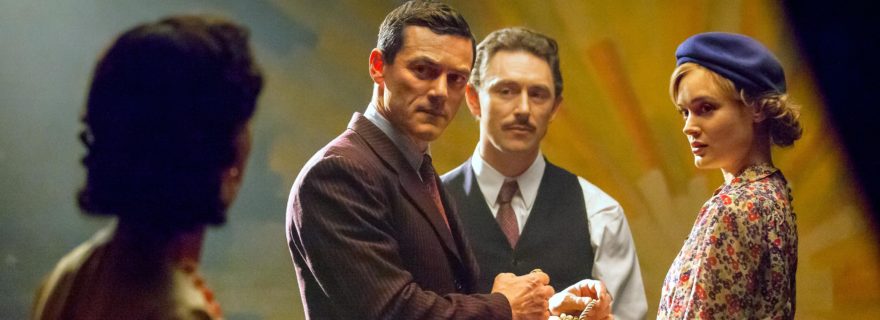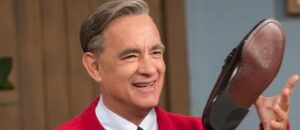'Professor Marston and the Wonder Women'
Movie Rating:
3.5
Rushed into production to hit theater screens the same year as the long-awaited ‘Wonder Woman’ blockbuster, ‘Professor Marston and the Wonder Women’ stinks of Oscar bait exploitation on the surface. However, that’s only true if you’re unfamiliar with the story behind the first and finest superheroine. This is a wild and (please excuse the pun) wonderful tale all its own that feels as relevant today as the image of Gal Gadot storming the trenches. The movie may have a little of the usual bio cheese, but not as much as you’d think.
For those who have never looked into the origin of the Wonder Woman character (i.e. most people), she was created by professor William Moulton Marston (Luke Evans). He also invented the lie detector, and in a way the origins of the character began when he was developing that machine. Marston was teaching classes in the sister women’s college at Harvard. His wife, Elizabeth Marston (Rebecca Hall), was his assistant since early 20th Century academic sexism prevented her from holding a professorship herself. Together, they formed a remarkably progressive and enjoyably cynical couple preaching their beliefs to anyone who would listen. This attracted the attention of a student named Olive (Bella Heathcote).
The duo soon become a trio as they fall in love while creating the lie detector (a useful writing tool to get secrets out in the open). Their relationship quickly leads to shunning and firing. They move away, get quiet jobs, form a family and create a secret identity for themselves under the guise of a single mother and a couple living under the same roof. Then they get into early bondage, and through that imagery and their politics, Marston creates Wonder Woman. The comic book character is an instant hit, but also controversial due to the radical politics and alternative sexuality that Marston sneaks into the panels. That eventually leads to Marston being forced to defend the work to a group of concerned parents who want to ban Wonder Woman.
The whole story unfolds in flashback while Marston is defending his work. The poly and kink relationship is spelled out alongside the professor’s grand theory of life and the origin of Wonder Woman. Truth be told, the storytelling techniques that writer/director Angela Robinson use here are all rather on-the-nose and manipulative. At times, that can be distracting. However, it comes with a certain purpose. The filmmaker deliberately uses the soft and cozy trappings of a handsome period bio-pic to sneak in some progressive politics and sexuality. Robinson creates a recognizably middlebrow aesthetic to sell a tale of polyamorous love to the masses. It’s a curious combination that can be frustrating in its reliance on cliché and thuddingly obvious in its depiction of Wonder Woman’s origins. At the same time, there’s something refreshing about a story this potentially controversial feeling so sweet and even inspiring.
The movie looks postcard pretty in ways that normalize all the unconventional love and sex on screen. It’s very tastefully sweet yet mildly subversive in such a mainstream package. The central trio of performances are just as charming. Evans comes off as a wayward dreamer ahead of his time. Hall channels early Emma Thompson at her most witty and cutting, while Heathcote grows her innocent waif into a knowing woman. It’s hard not to fall in love with the three of them.
The writing and filmmaking techniques may be grossly manipulative, but at least they’re grossly manipulative with a purpose. This all leads to a film that normalizes and celebrates a style of relationship rarely shown so softly. That this life so directly feeds into the origins of Wonder Woman in subtly fascinating ways only makes the movie more relevant and exciting at this particular cultural moment.
Ultimately, ‘Professor Marston and the Wonder Women’ is a glossy Oscar bait bio-pic with all the strengths and limitations that implies. What makes it special is how Angela Robinson is able to use those familiar conventions to create such an unconventional love story. Facts may get fudged for the sake narrative clarity and viewers may be manipulated willy-nilly, but it’s in the service of a secret slice of history so bizarre, funny, odd and moving that the movie overcomes its tiresome genre trappings. It was worth rushing this into production. Now that the Wonder Woman conventions are so fresh in viewers’ collective minds, it’s fascinating to see the strange and inspiring way that the iconic hero came to be. Just don’t bring the kids. That’ll lead to an awkward ride home.




Chapz Kilud
This was by far the best movie I saw this year out of the 40+ I’ve seen in theaters. This movie was beautifully done, and funny at times. In our society with increasing hate, intolerance, bigotry, and degradation of women, this movie can teach people a lot about love. It might be a different kind of love/life style we may not agree with. As Pope Francis said, “who am I to judge?”